Analysis of Tourism and Hospitality Research Papers
VerifiedAdded on 2020/07/23
|16
|2866
|83
AI Summary
The assignment provided is a collection of research papers on the topic of tourism and hospitality. The papers cover various aspects of tourism, including the impact of social media on consumer decision-making, factors influencing tourist food consumption, and the economic benefits of tourism for island economies. The analysis also touches on sustainable tourism practices and climate change mitigation strategies. The document is a valuable resource for students and researchers in the field of tourism and hospitality.
Contribute Materials
Your contribution can guide someone’s learning journey. Share your
documents today.
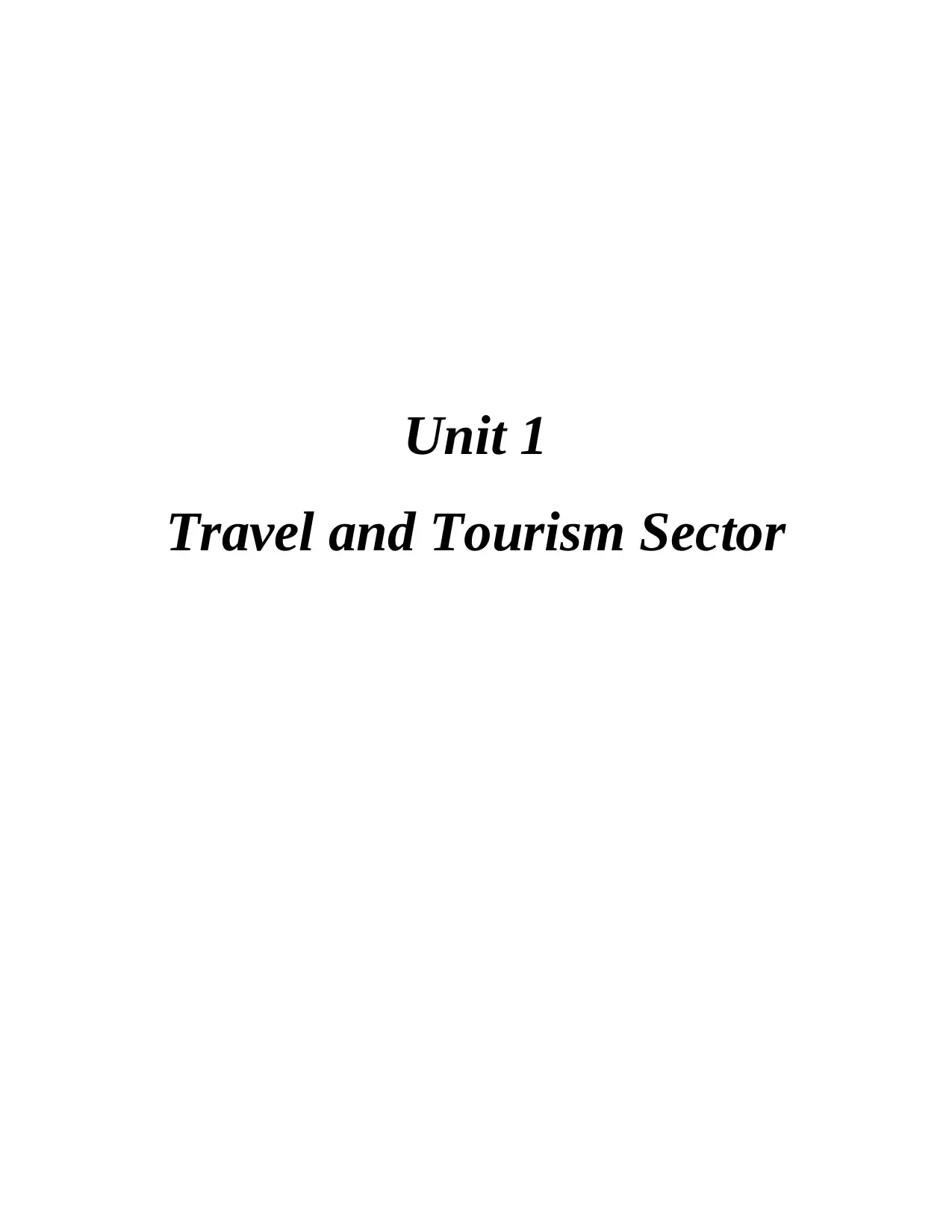
Unit 1
Travel and Tourism Sector
Travel and Tourism Sector
Secure Best Marks with AI Grader
Need help grading? Try our AI Grader for instant feedback on your assignments.
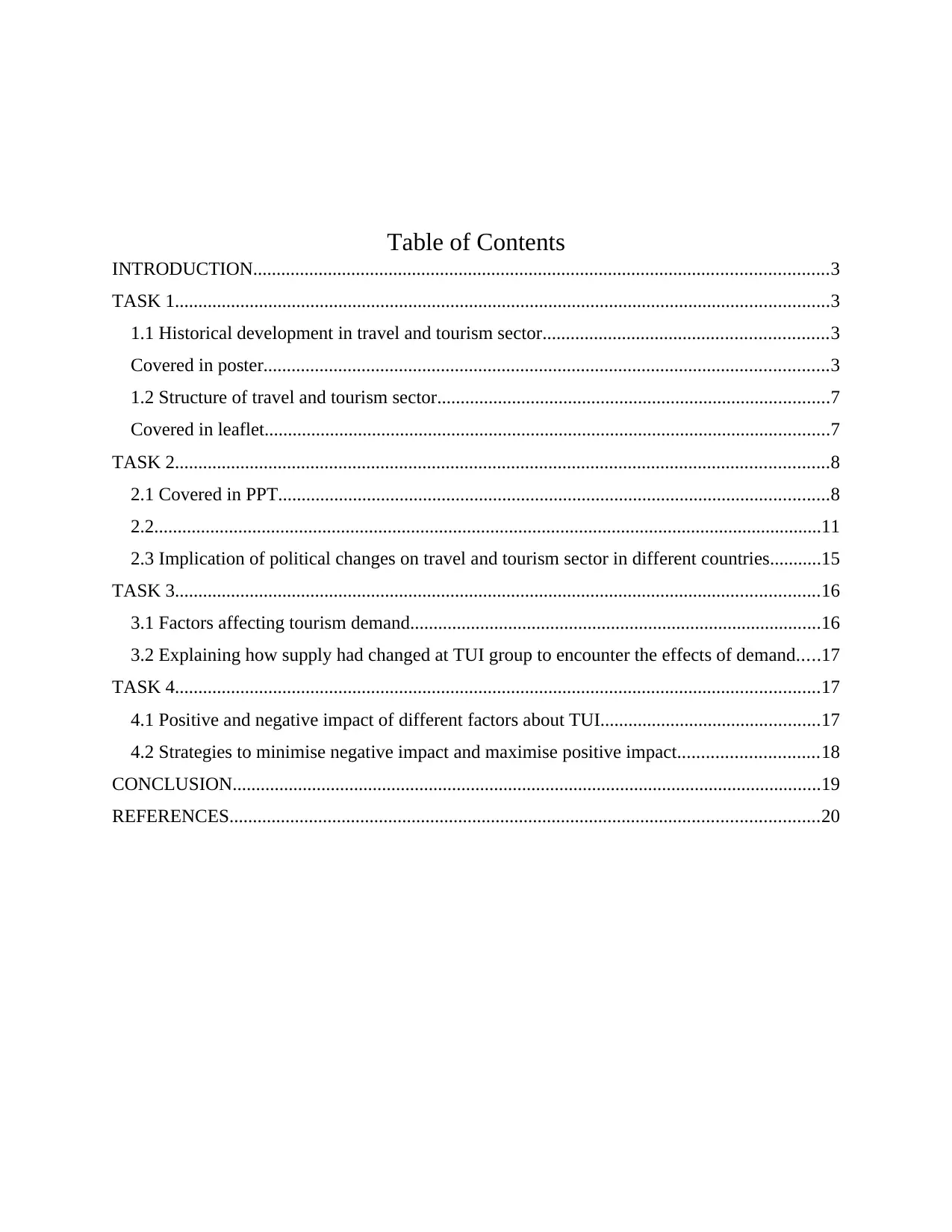
Table of Contents
INTRODUCTION...........................................................................................................................3
TASK 1............................................................................................................................................3
1.1 Historical development in travel and tourism sector.............................................................3
Covered in poster.........................................................................................................................3
1.2 Structure of travel and tourism sector....................................................................................7
Covered in leaflet.........................................................................................................................7
TASK 2............................................................................................................................................8
2.1 Covered in PPT......................................................................................................................8
2.2...............................................................................................................................................11
2.3 Implication of political changes on travel and tourism sector in different countries...........15
TASK 3..........................................................................................................................................16
3.1 Factors affecting tourism demand........................................................................................16
3.2 Explaining how supply had changed at TUI group to encounter the effects of demand.....17
TASK 4..........................................................................................................................................17
4.1 Positive and negative impact of different factors about TUI...............................................17
4.2 Strategies to minimise negative impact and maximise positive impact..............................18
CONCLUSION..............................................................................................................................19
REFERENCES..............................................................................................................................20
INTRODUCTION...........................................................................................................................3
TASK 1............................................................................................................................................3
1.1 Historical development in travel and tourism sector.............................................................3
Covered in poster.........................................................................................................................3
1.2 Structure of travel and tourism sector....................................................................................7
Covered in leaflet.........................................................................................................................7
TASK 2............................................................................................................................................8
2.1 Covered in PPT......................................................................................................................8
2.2...............................................................................................................................................11
2.3 Implication of political changes on travel and tourism sector in different countries...........15
TASK 3..........................................................................................................................................16
3.1 Factors affecting tourism demand........................................................................................16
3.2 Explaining how supply had changed at TUI group to encounter the effects of demand.....17
TASK 4..........................................................................................................................................17
4.1 Positive and negative impact of different factors about TUI...............................................17
4.2 Strategies to minimise negative impact and maximise positive impact..............................18
CONCLUSION..............................................................................................................................19
REFERENCES..............................................................................................................................20
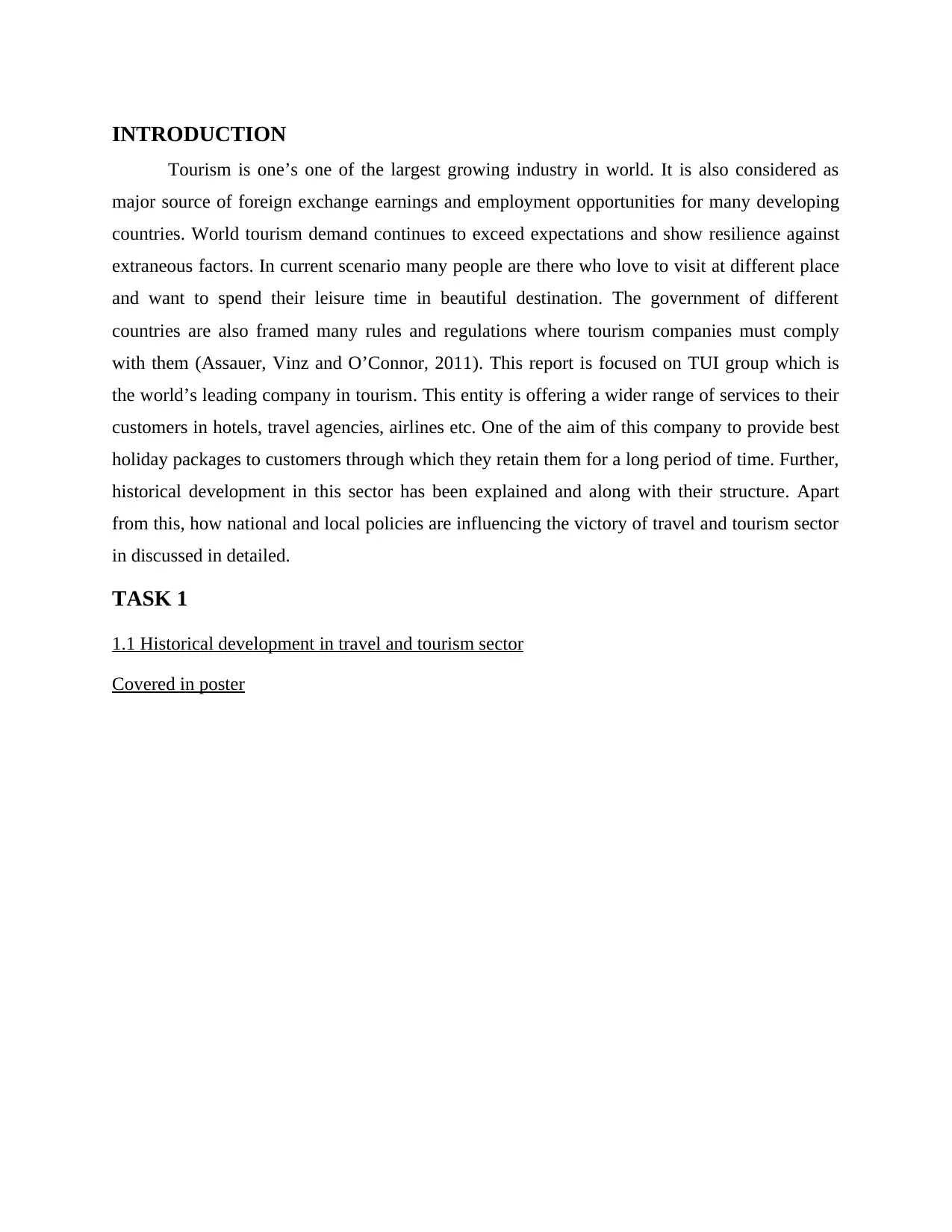
INTRODUCTION
Tourism is one’s one of the largest growing industry in world. It is also considered as
major source of foreign exchange earnings and employment opportunities for many developing
countries. World tourism demand continues to exceed expectations and show resilience against
extraneous factors. In current scenario many people are there who love to visit at different place
and want to spend their leisure time in beautiful destination. The government of different
countries are also framed many rules and regulations where tourism companies must comply
with them (Assauer, Vinz and O’Connor, 2011). This report is focused on TUI group which is
the world’s leading company in tourism. This entity is offering a wider range of services to their
customers in hotels, travel agencies, airlines etc. One of the aim of this company to provide best
holiday packages to customers through which they retain them for a long period of time. Further,
historical development in this sector has been explained and along with their structure. Apart
from this, how national and local policies are influencing the victory of travel and tourism sector
in discussed in detailed.
TASK 1
1.1 Historical development in travel and tourism sector
Covered in poster
Tourism is one’s one of the largest growing industry in world. It is also considered as
major source of foreign exchange earnings and employment opportunities for many developing
countries. World tourism demand continues to exceed expectations and show resilience against
extraneous factors. In current scenario many people are there who love to visit at different place
and want to spend their leisure time in beautiful destination. The government of different
countries are also framed many rules and regulations where tourism companies must comply
with them (Assauer, Vinz and O’Connor, 2011). This report is focused on TUI group which is
the world’s leading company in tourism. This entity is offering a wider range of services to their
customers in hotels, travel agencies, airlines etc. One of the aim of this company to provide best
holiday packages to customers through which they retain them for a long period of time. Further,
historical development in this sector has been explained and along with their structure. Apart
from this, how national and local policies are influencing the victory of travel and tourism sector
in discussed in detailed.
TASK 1
1.1 Historical development in travel and tourism sector
Covered in poster
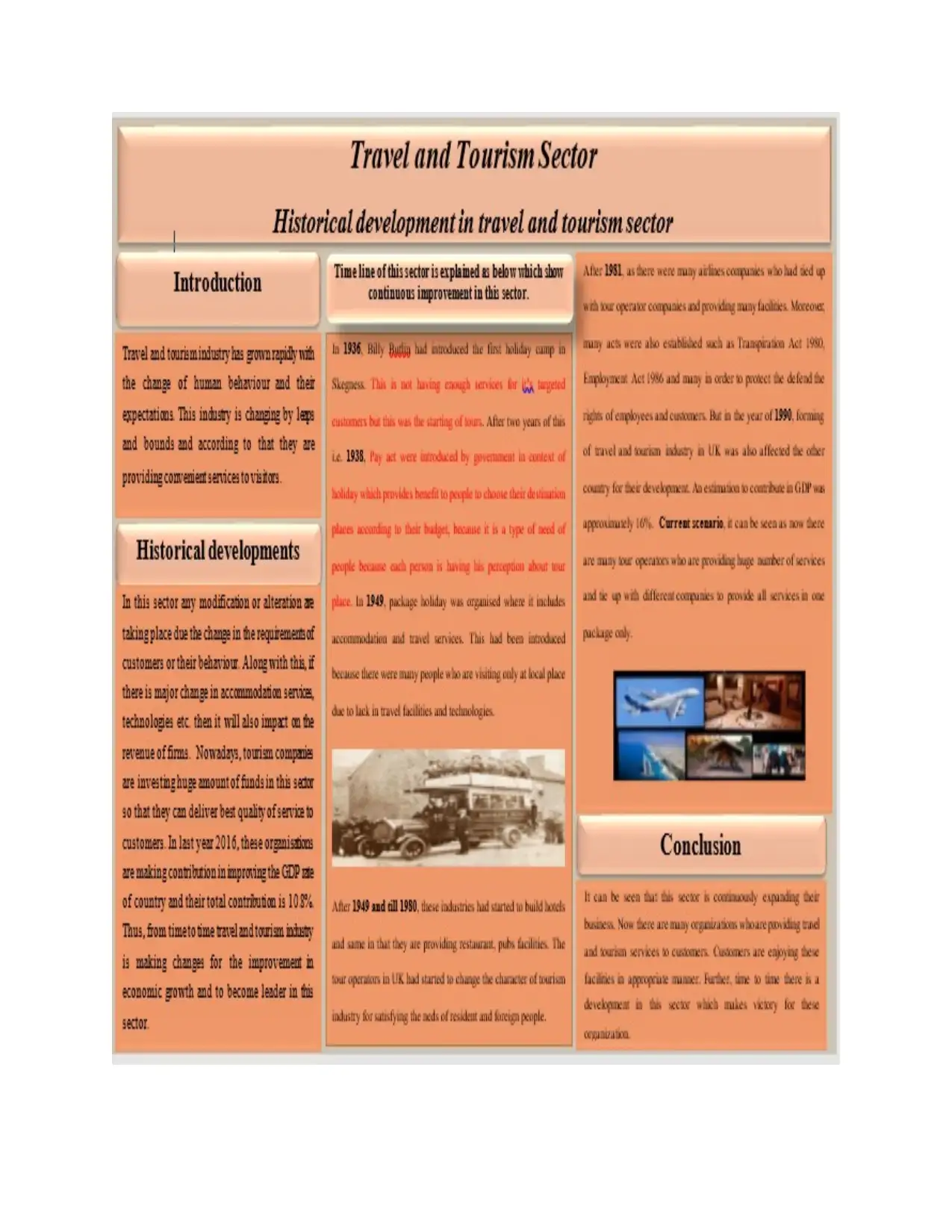
Secure Best Marks with AI Grader
Need help grading? Try our AI Grader for instant feedback on your assignments.
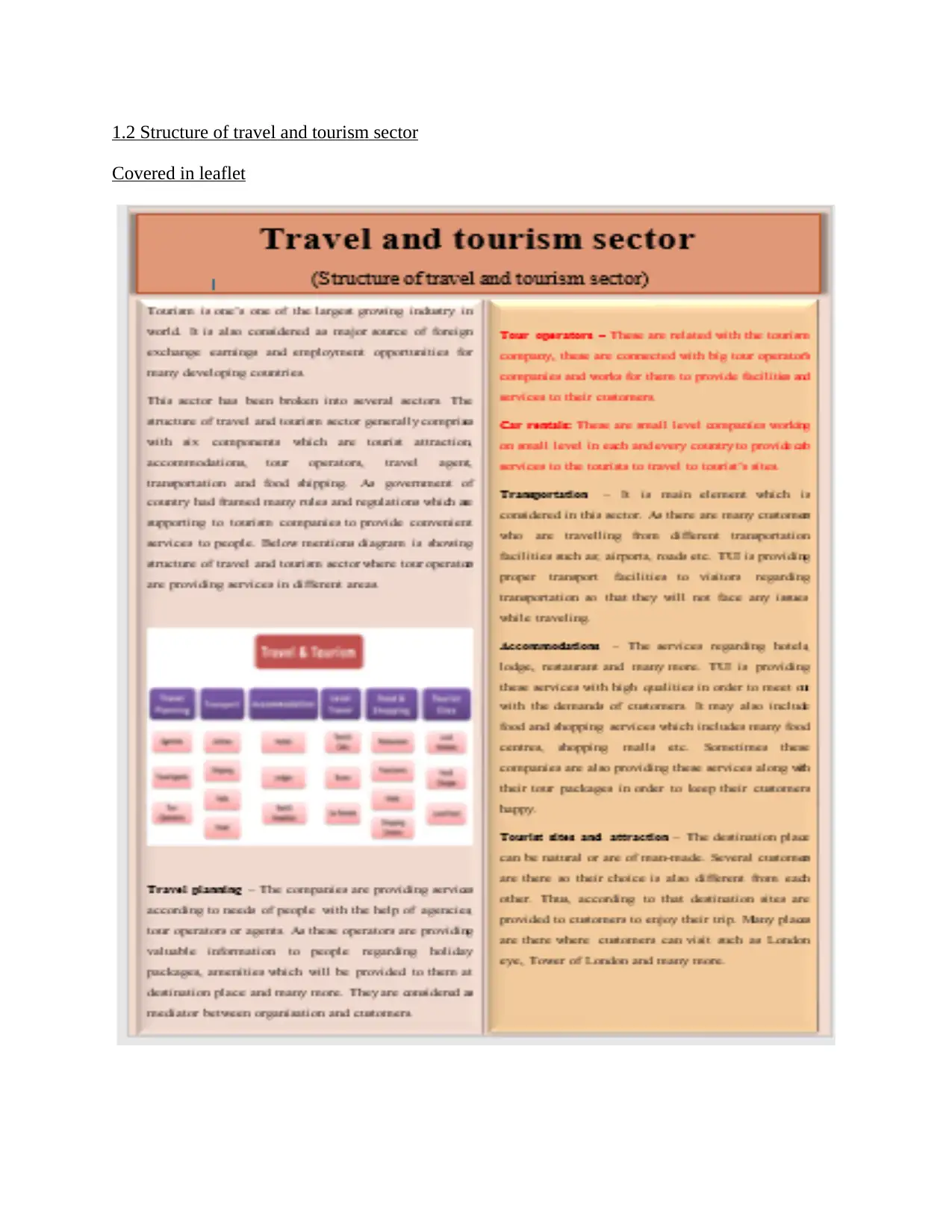
1.2 Structure of travel and tourism sector
Covered in leaflet
Covered in leaflet
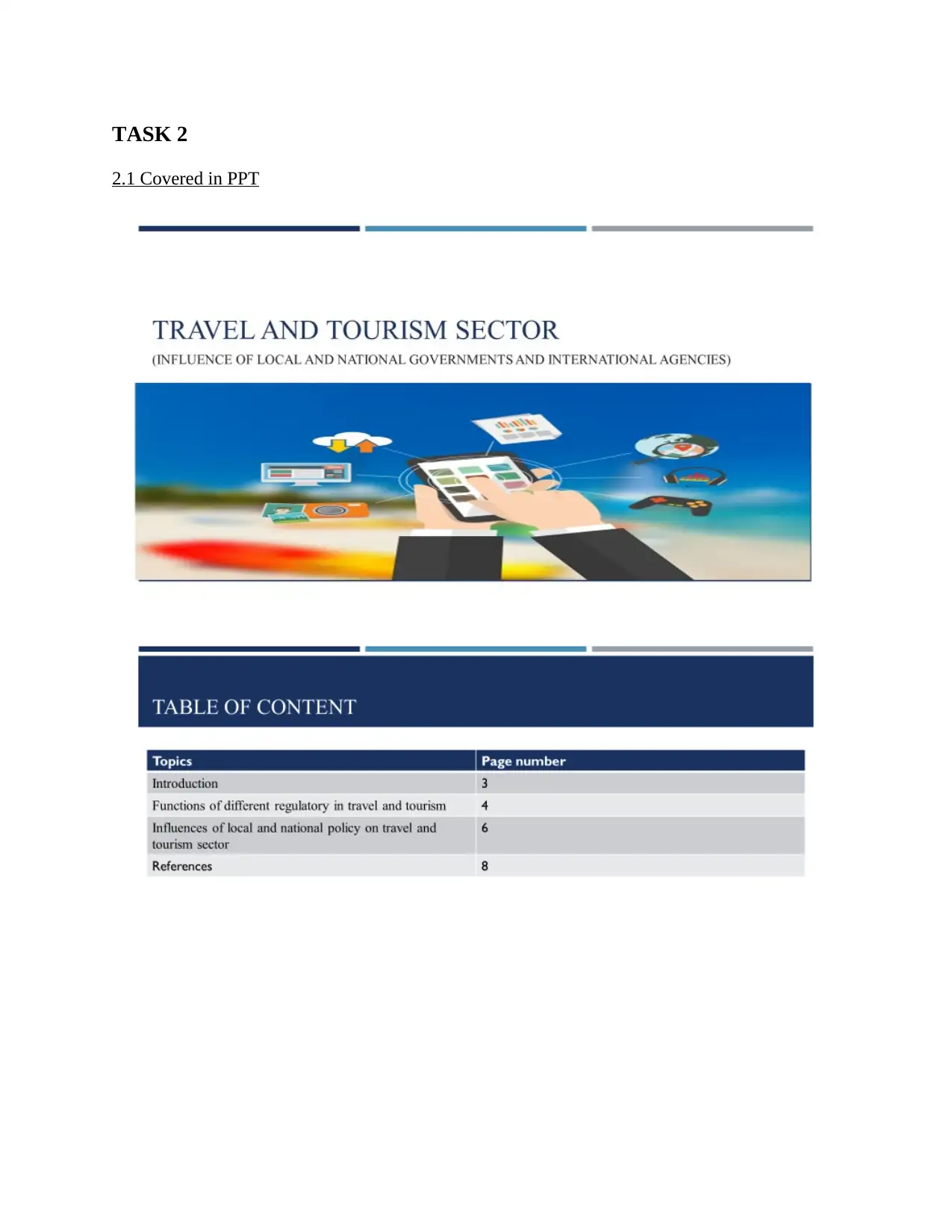
TASK 2
2.1 Covered in PPT
2.1 Covered in PPT
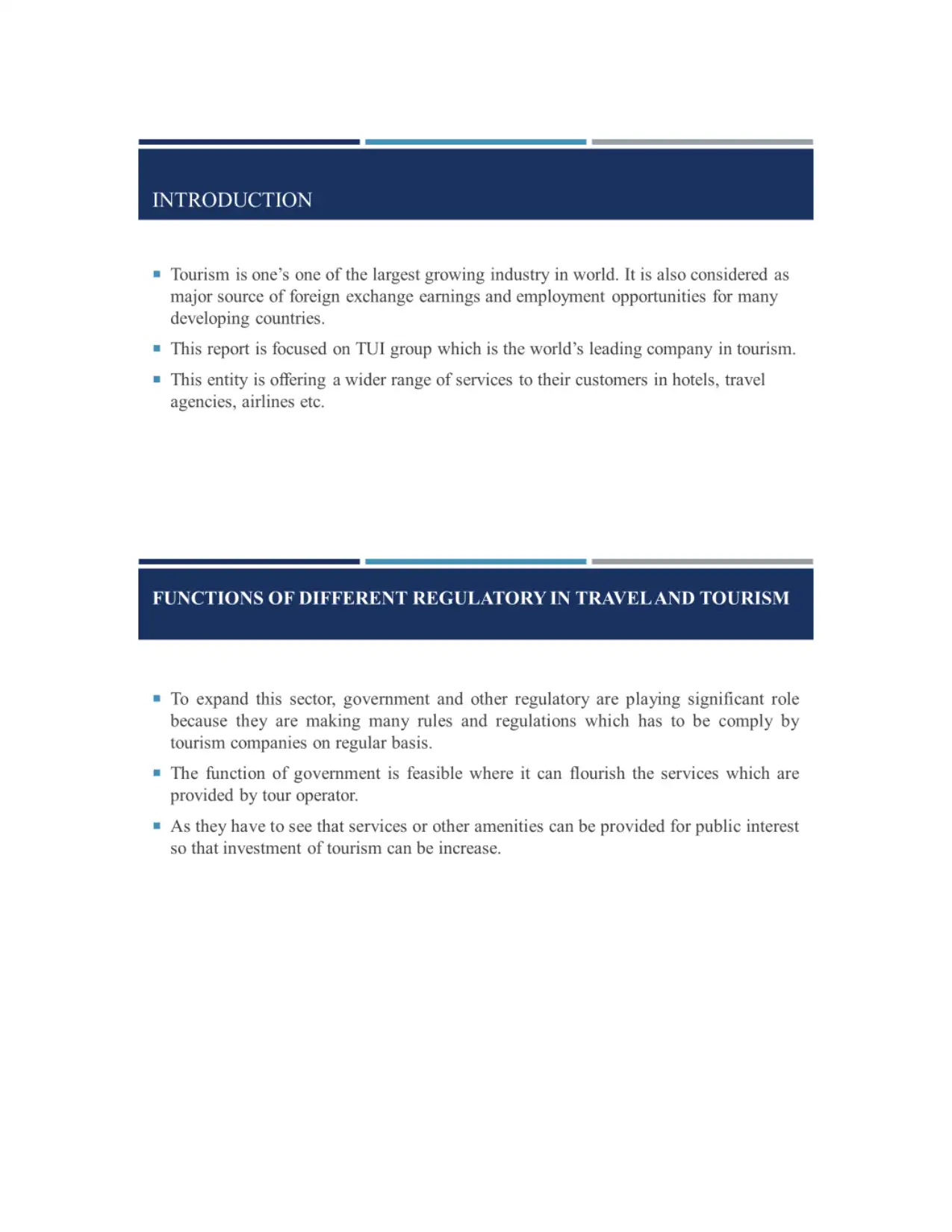
Paraphrase This Document
Need a fresh take? Get an instant paraphrase of this document with our AI Paraphraser
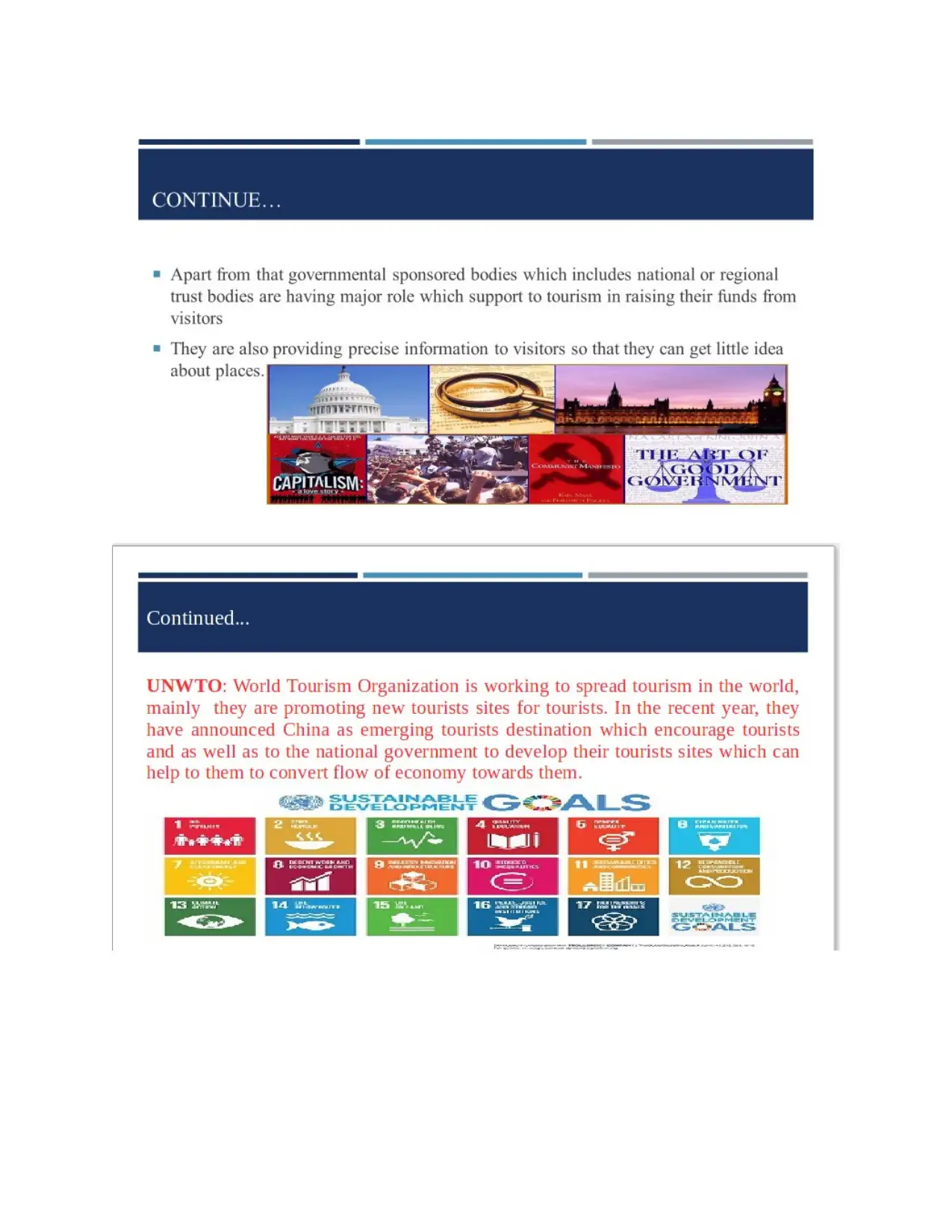
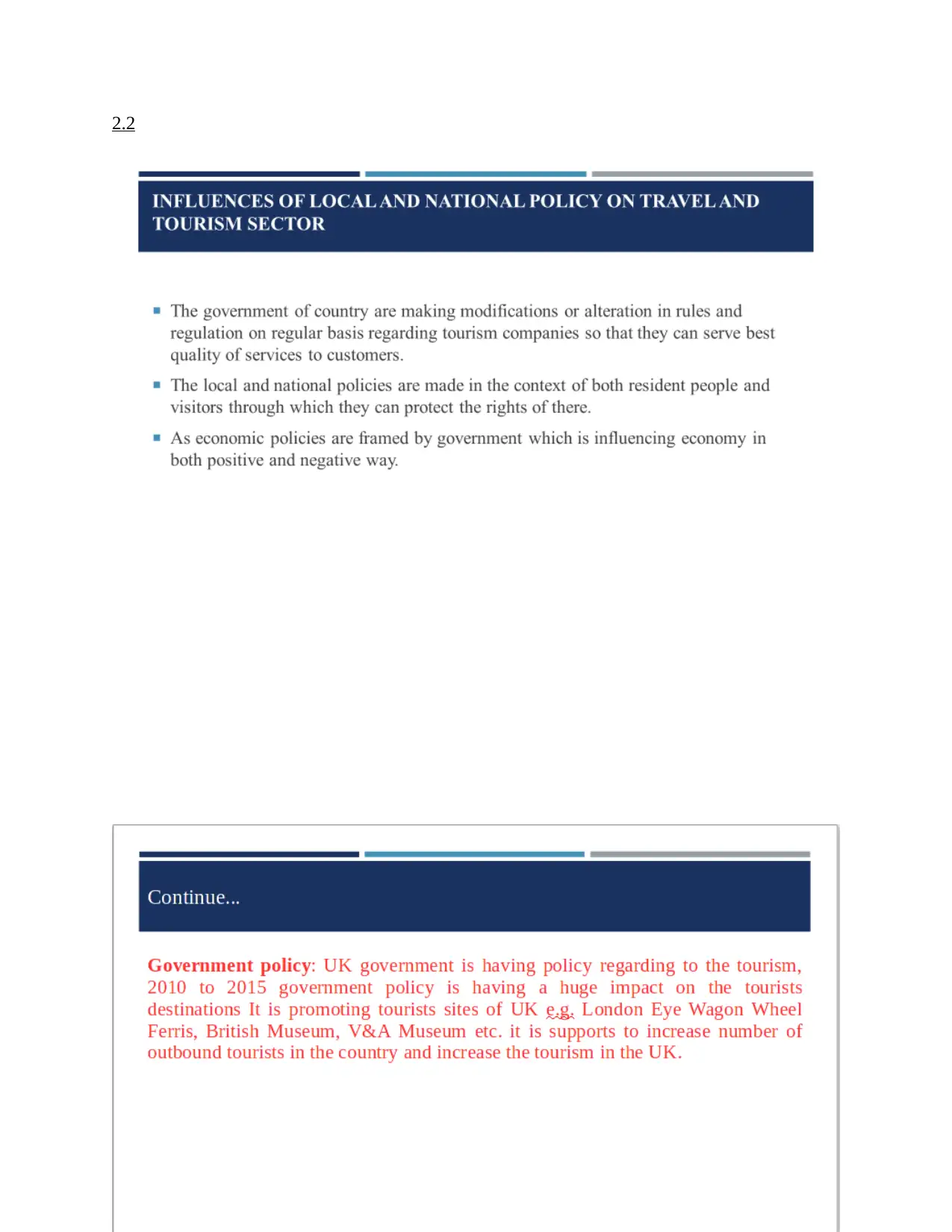
2.2
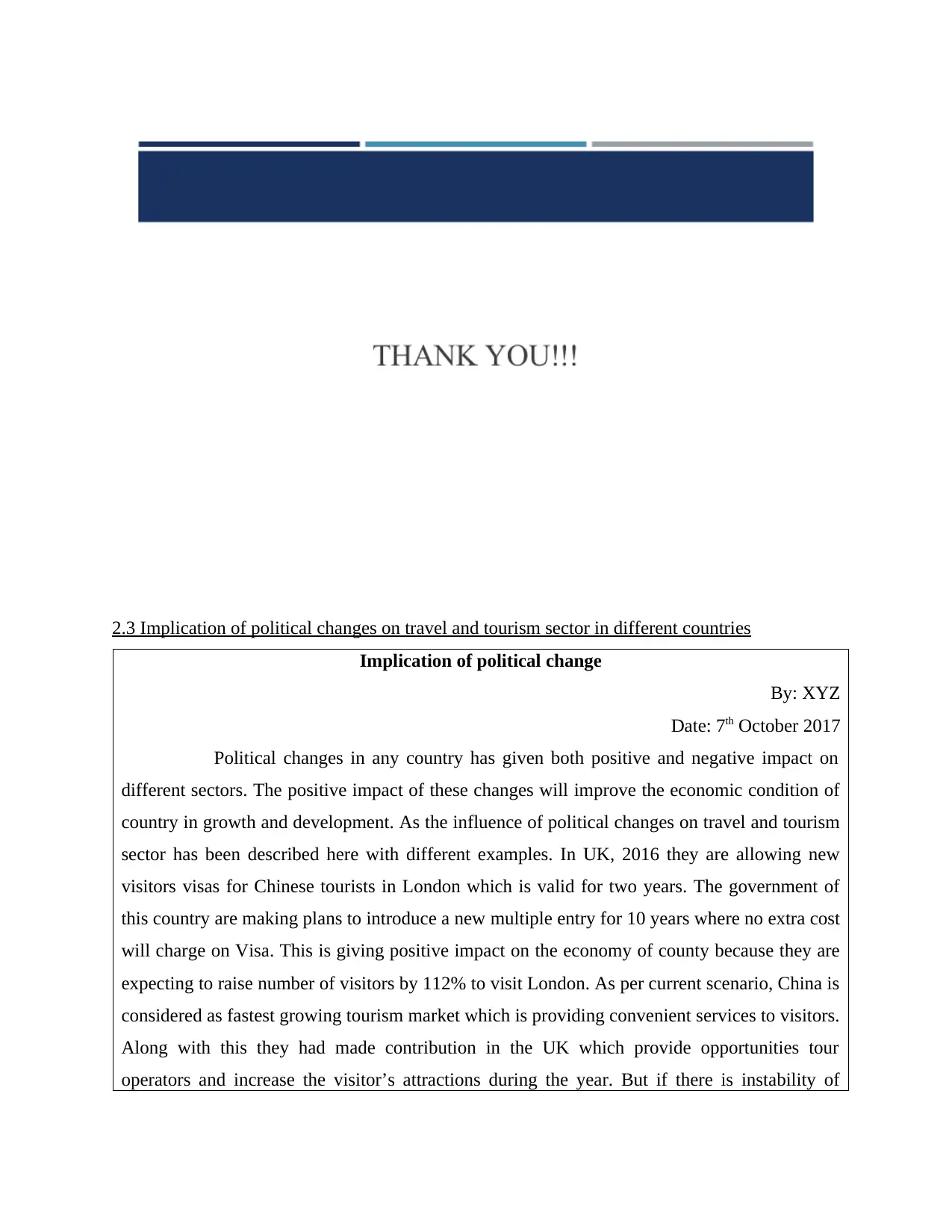
2.3 Implication of political changes on travel and tourism sector in different countries
Implication of political change
By: XYZ
Date: 7th October 2017
Political changes in any country has given both positive and negative impact on
different sectors. The positive impact of these changes will improve the economic condition of
country in growth and development. As the influence of political changes on travel and tourism
sector has been described here with different examples. In UK, 2016 they are allowing new
visitors visas for Chinese tourists in London which is valid for two years. The government of
this country are making plans to introduce a new multiple entry for 10 years where no extra cost
will charge on Visa. This is giving positive impact on the economy of county because they are
expecting to raise number of visitors by 112% to visit London. As per current scenario, China is
considered as fastest growing tourism market which is providing convenient services to visitors.
Along with this they had made contribution in the UK which provide opportunities tour
operators and increase the visitor’s attractions during the year. But if there is instability of
Implication of political change
By: XYZ
Date: 7th October 2017
Political changes in any country has given both positive and negative impact on
different sectors. The positive impact of these changes will improve the economic condition of
country in growth and development. As the influence of political changes on travel and tourism
sector has been described here with different examples. In UK, 2016 they are allowing new
visitors visas for Chinese tourists in London which is valid for two years. The government of
this country are making plans to introduce a new multiple entry for 10 years where no extra cost
will charge on Visa. This is giving positive impact on the economy of county because they are
expecting to raise number of visitors by 112% to visit London. As per current scenario, China is
considered as fastest growing tourism market which is providing convenient services to visitors.
Along with this they had made contribution in the UK which provide opportunities tour
operators and increase the visitor’s attractions during the year. But if there is instability of
Secure Best Marks with AI Grader
Need help grading? Try our AI Grader for instant feedback on your assignments.
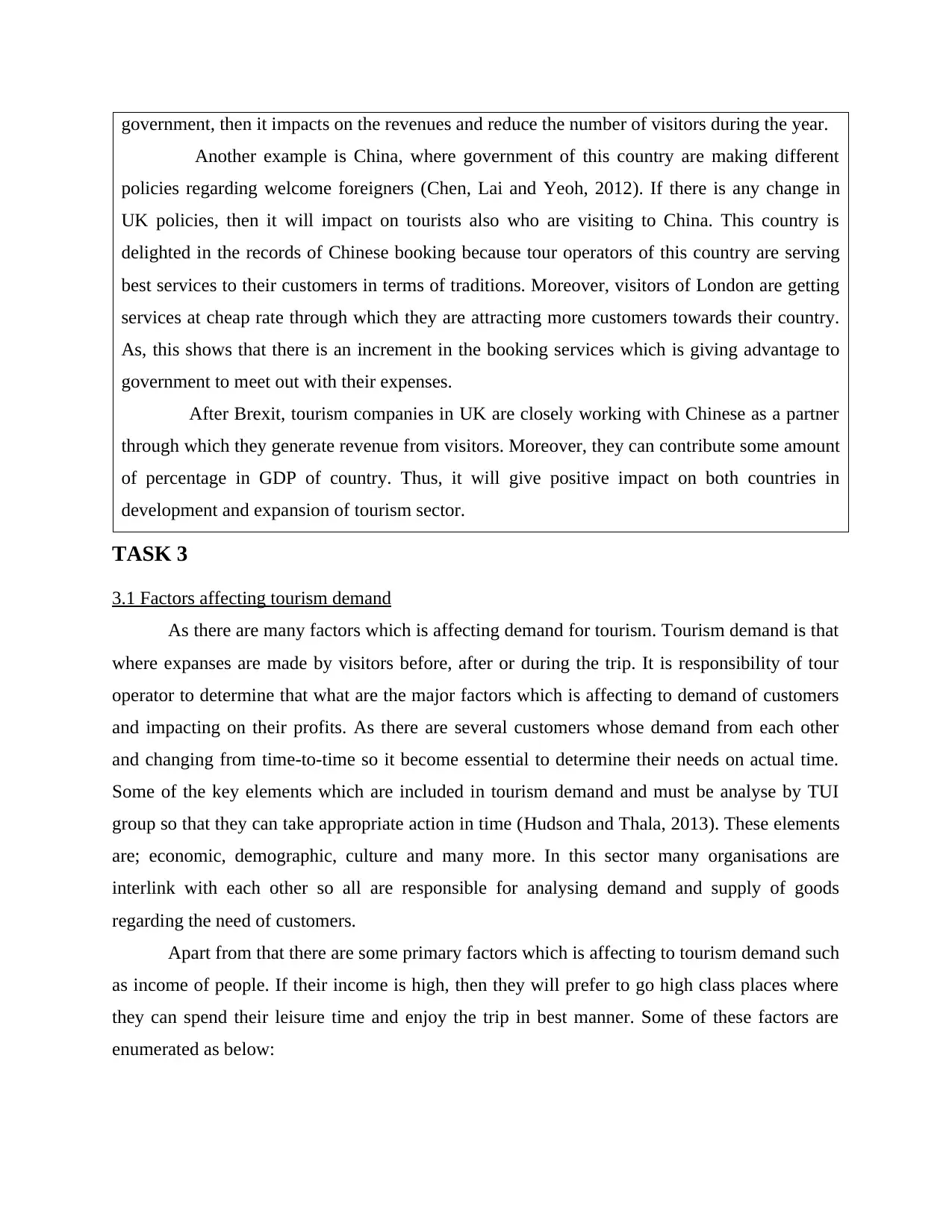
government, then it impacts on the revenues and reduce the number of visitors during the year.
Another example is China, where government of this country are making different
policies regarding welcome foreigners (Chen, Lai and Yeoh, 2012). If there is any change in
UK policies, then it will impact on tourists also who are visiting to China. This country is
delighted in the records of Chinese booking because tour operators of this country are serving
best services to their customers in terms of traditions. Moreover, visitors of London are getting
services at cheap rate through which they are attracting more customers towards their country.
As, this shows that there is an increment in the booking services which is giving advantage to
government to meet out with their expenses.
After Brexit, tourism companies in UK are closely working with Chinese as a partner
through which they generate revenue from visitors. Moreover, they can contribute some amount
of percentage in GDP of country. Thus, it will give positive impact on both countries in
development and expansion of tourism sector.
TASK 3
3.1 Factors affecting tourism demand
As there are many factors which is affecting demand for tourism. Tourism demand is that
where expanses are made by visitors before, after or during the trip. It is responsibility of tour
operator to determine that what are the major factors which is affecting to demand of customers
and impacting on their profits. As there are several customers whose demand from each other
and changing from time-to-time so it become essential to determine their needs on actual time.
Some of the key elements which are included in tourism demand and must be analyse by TUI
group so that they can take appropriate action in time (Hudson and Thala, 2013). These elements
are; economic, demographic, culture and many more. In this sector many organisations are
interlink with each other so all are responsible for analysing demand and supply of goods
regarding the need of customers.
Apart from that there are some primary factors which is affecting to tourism demand such
as income of people. If their income is high, then they will prefer to go high class places where
they can spend their leisure time and enjoy the trip in best manner. Some of these factors are
enumerated as below:
Another example is China, where government of this country are making different
policies regarding welcome foreigners (Chen, Lai and Yeoh, 2012). If there is any change in
UK policies, then it will impact on tourists also who are visiting to China. This country is
delighted in the records of Chinese booking because tour operators of this country are serving
best services to their customers in terms of traditions. Moreover, visitors of London are getting
services at cheap rate through which they are attracting more customers towards their country.
As, this shows that there is an increment in the booking services which is giving advantage to
government to meet out with their expenses.
After Brexit, tourism companies in UK are closely working with Chinese as a partner
through which they generate revenue from visitors. Moreover, they can contribute some amount
of percentage in GDP of country. Thus, it will give positive impact on both countries in
development and expansion of tourism sector.
TASK 3
3.1 Factors affecting tourism demand
As there are many factors which is affecting demand for tourism. Tourism demand is that
where expanses are made by visitors before, after or during the trip. It is responsibility of tour
operator to determine that what are the major factors which is affecting to demand of customers
and impacting on their profits. As there are several customers whose demand from each other
and changing from time-to-time so it become essential to determine their needs on actual time.
Some of the key elements which are included in tourism demand and must be analyse by TUI
group so that they can take appropriate action in time (Hudson and Thala, 2013). These elements
are; economic, demographic, culture and many more. In this sector many organisations are
interlink with each other so all are responsible for analysing demand and supply of goods
regarding the need of customers.
Apart from that there are some primary factors which is affecting to tourism demand such
as income of people. If their income is high, then they will prefer to go high class places where
they can spend their leisure time and enjoy the trip in best manner. Some of these factors are
enumerated as below:
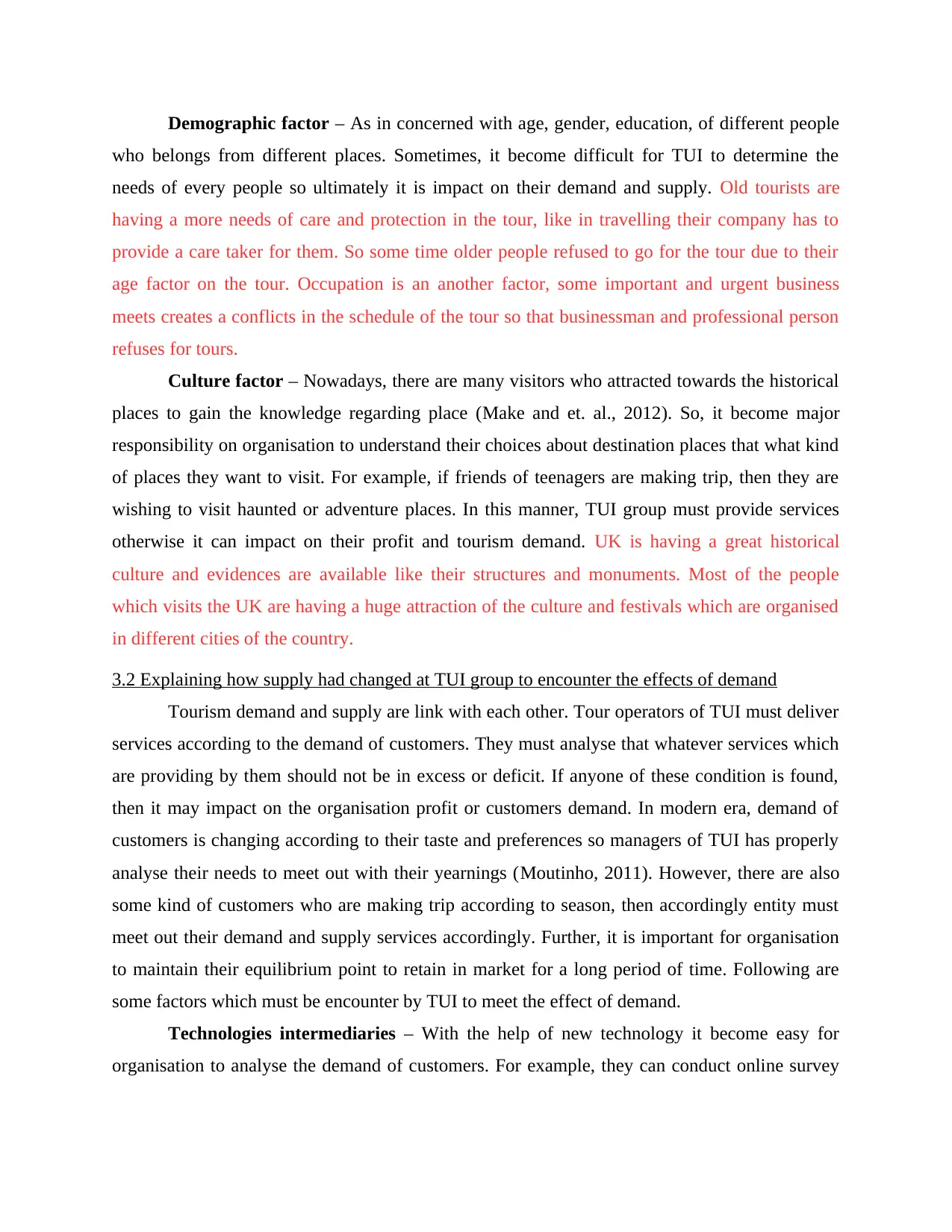
Demographic factor – As in concerned with age, gender, education, of different people
who belongs from different places. Sometimes, it become difficult for TUI to determine the
needs of every people so ultimately it is impact on their demand and supply. Old tourists are
having a more needs of care and protection in the tour, like in travelling their company has to
provide a care taker for them. So some time older people refused to go for the tour due to their
age factor on the tour. Occupation is an another factor, some important and urgent business
meets creates a conflicts in the schedule of the tour so that businessman and professional person
refuses for tours.
Culture factor – Nowadays, there are many visitors who attracted towards the historical
places to gain the knowledge regarding place (Make and et. al., 2012). So, it become major
responsibility on organisation to understand their choices about destination places that what kind
of places they want to visit. For example, if friends of teenagers are making trip, then they are
wishing to visit haunted or adventure places. In this manner, TUI group must provide services
otherwise it can impact on their profit and tourism demand. UK is having a great historical
culture and evidences are available like their structures and monuments. Most of the people
which visits the UK are having a huge attraction of the culture and festivals which are organised
in different cities of the country.
3.2 Explaining how supply had changed at TUI group to encounter the effects of demand
Tourism demand and supply are link with each other. Tour operators of TUI must deliver
services according to the demand of customers. They must analyse that whatever services which
are providing by them should not be in excess or deficit. If anyone of these condition is found,
then it may impact on the organisation profit or customers demand. In modern era, demand of
customers is changing according to their taste and preferences so managers of TUI has properly
analyse their needs to meet out with their yearnings (Moutinho, 2011). However, there are also
some kind of customers who are making trip according to season, then accordingly entity must
meet out their demand and supply services accordingly. Further, it is important for organisation
to maintain their equilibrium point to retain in market for a long period of time. Following are
some factors which must be encounter by TUI to meet the effect of demand.
Technologies intermediaries – With the help of new technology it become easy for
organisation to analyse the demand of customers. For example, they can conduct online survey
who belongs from different places. Sometimes, it become difficult for TUI to determine the
needs of every people so ultimately it is impact on their demand and supply. Old tourists are
having a more needs of care and protection in the tour, like in travelling their company has to
provide a care taker for them. So some time older people refused to go for the tour due to their
age factor on the tour. Occupation is an another factor, some important and urgent business
meets creates a conflicts in the schedule of the tour so that businessman and professional person
refuses for tours.
Culture factor – Nowadays, there are many visitors who attracted towards the historical
places to gain the knowledge regarding place (Make and et. al., 2012). So, it become major
responsibility on organisation to understand their choices about destination places that what kind
of places they want to visit. For example, if friends of teenagers are making trip, then they are
wishing to visit haunted or adventure places. In this manner, TUI group must provide services
otherwise it can impact on their profit and tourism demand. UK is having a great historical
culture and evidences are available like their structures and monuments. Most of the people
which visits the UK are having a huge attraction of the culture and festivals which are organised
in different cities of the country.
3.2 Explaining how supply had changed at TUI group to encounter the effects of demand
Tourism demand and supply are link with each other. Tour operators of TUI must deliver
services according to the demand of customers. They must analyse that whatever services which
are providing by them should not be in excess or deficit. If anyone of these condition is found,
then it may impact on the organisation profit or customers demand. In modern era, demand of
customers is changing according to their taste and preferences so managers of TUI has properly
analyse their needs to meet out with their yearnings (Moutinho, 2011). However, there are also
some kind of customers who are making trip according to season, then accordingly entity must
meet out their demand and supply services accordingly. Further, it is important for organisation
to maintain their equilibrium point to retain in market for a long period of time. Following are
some factors which must be encounter by TUI to meet the effect of demand.
Technologies intermediaries – With the help of new technology it become easy for
organisation to analyse the demand of customers. For example, they can conduct online survey
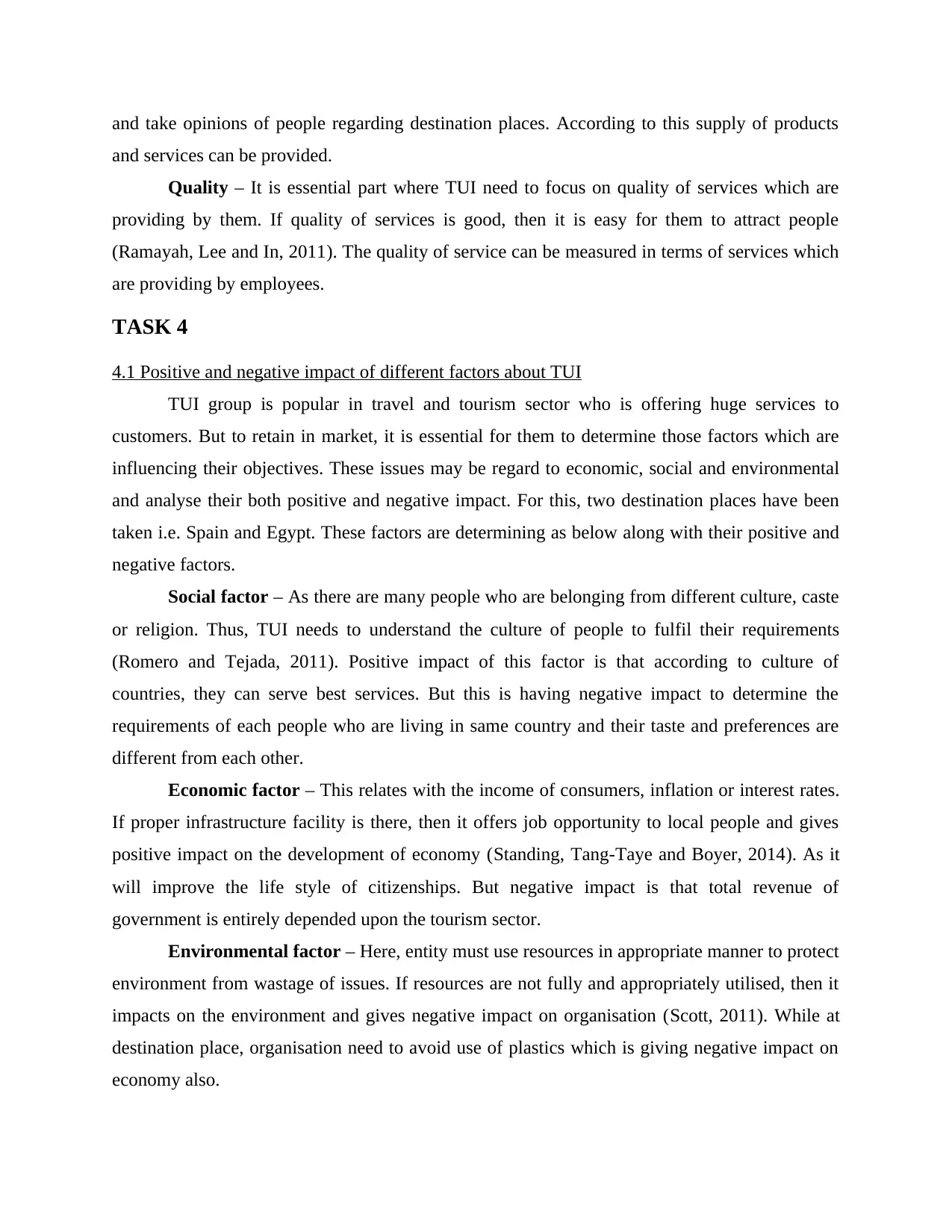
and take opinions of people regarding destination places. According to this supply of products
and services can be provided.
Quality – It is essential part where TUI need to focus on quality of services which are
providing by them. If quality of services is good, then it is easy for them to attract people
(Ramayah, Lee and In, 2011). The quality of service can be measured in terms of services which
are providing by employees.
TASK 4
4.1 Positive and negative impact of different factors about TUI
TUI group is popular in travel and tourism sector who is offering huge services to
customers. But to retain in market, it is essential for them to determine those factors which are
influencing their objectives. These issues may be regard to economic, social and environmental
and analyse their both positive and negative impact. For this, two destination places have been
taken i.e. Spain and Egypt. These factors are determining as below along with their positive and
negative factors.
Social factor – As there are many people who are belonging from different culture, caste
or religion. Thus, TUI needs to understand the culture of people to fulfil their requirements
(Romero and Tejada, 2011). Positive impact of this factor is that according to culture of
countries, they can serve best services. But this is having negative impact to determine the
requirements of each people who are living in same country and their taste and preferences are
different from each other.
Economic factor – This relates with the income of consumers, inflation or interest rates.
If proper infrastructure facility is there, then it offers job opportunity to local people and gives
positive impact on the development of economy (Standing, Tang-Taye and Boyer, 2014). As it
will improve the life style of citizenships. But negative impact is that total revenue of
government is entirely depended upon the tourism sector.
Environmental factor – Here, entity must use resources in appropriate manner to protect
environment from wastage of issues. If resources are not fully and appropriately utilised, then it
impacts on the environment and gives negative impact on organisation (Scott, 2011). While at
destination place, organisation need to avoid use of plastics which is giving negative impact on
economy also.
and services can be provided.
Quality – It is essential part where TUI need to focus on quality of services which are
providing by them. If quality of services is good, then it is easy for them to attract people
(Ramayah, Lee and In, 2011). The quality of service can be measured in terms of services which
are providing by employees.
TASK 4
4.1 Positive and negative impact of different factors about TUI
TUI group is popular in travel and tourism sector who is offering huge services to
customers. But to retain in market, it is essential for them to determine those factors which are
influencing their objectives. These issues may be regard to economic, social and environmental
and analyse their both positive and negative impact. For this, two destination places have been
taken i.e. Spain and Egypt. These factors are determining as below along with their positive and
negative factors.
Social factor – As there are many people who are belonging from different culture, caste
or religion. Thus, TUI needs to understand the culture of people to fulfil their requirements
(Romero and Tejada, 2011). Positive impact of this factor is that according to culture of
countries, they can serve best services. But this is having negative impact to determine the
requirements of each people who are living in same country and their taste and preferences are
different from each other.
Economic factor – This relates with the income of consumers, inflation or interest rates.
If proper infrastructure facility is there, then it offers job opportunity to local people and gives
positive impact on the development of economy (Standing, Tang-Taye and Boyer, 2014). As it
will improve the life style of citizenships. But negative impact is that total revenue of
government is entirely depended upon the tourism sector.
Environmental factor – Here, entity must use resources in appropriate manner to protect
environment from wastage of issues. If resources are not fully and appropriately utilised, then it
impacts on the environment and gives negative impact on organisation (Scott, 2011). While at
destination place, organisation need to avoid use of plastics which is giving negative impact on
economy also.
Paraphrase This Document
Need a fresh take? Get an instant paraphrase of this document with our AI Paraphraser
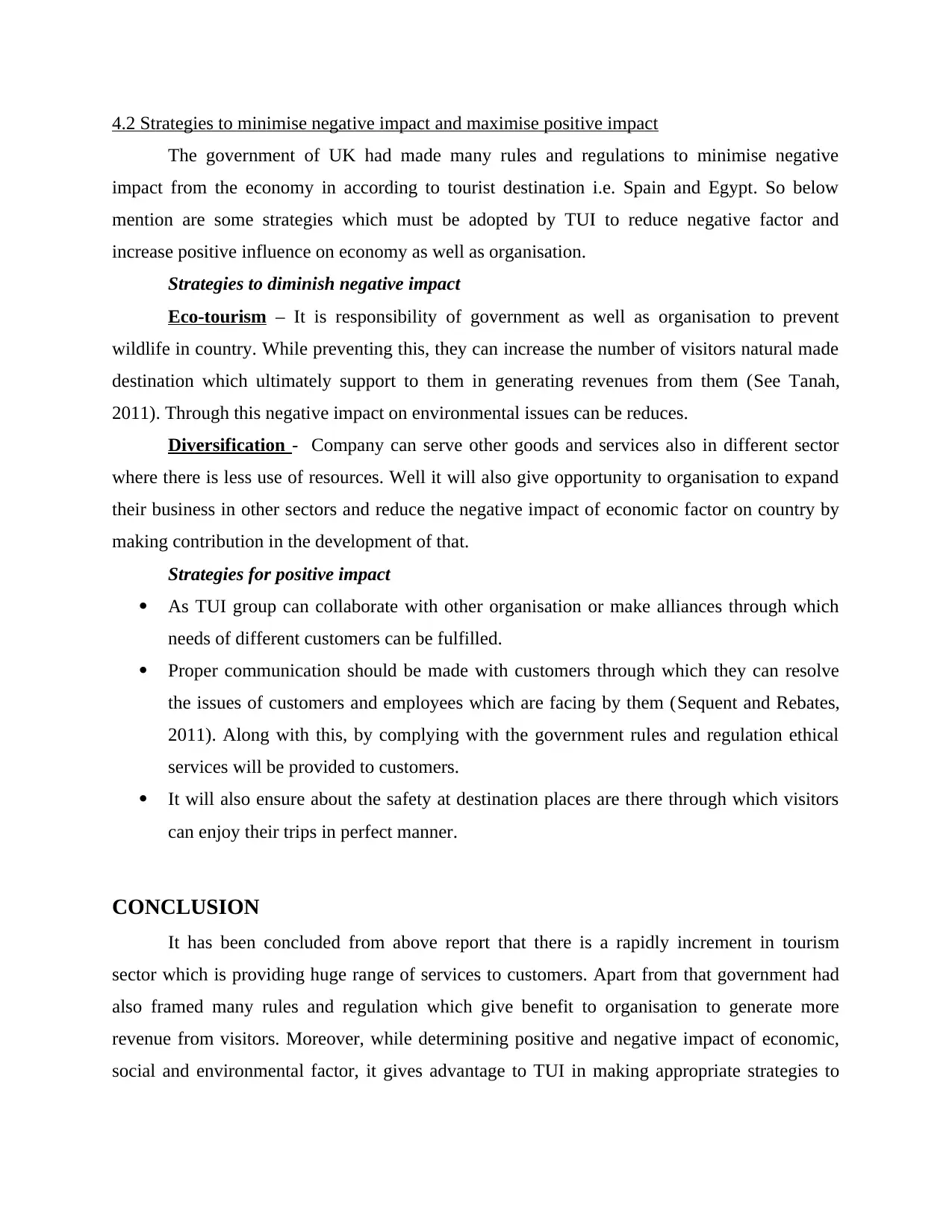
4.2 Strategies to minimise negative impact and maximise positive impact
The government of UK had made many rules and regulations to minimise negative
impact from the economy in according to tourist destination i.e. Spain and Egypt. So below
mention are some strategies which must be adopted by TUI to reduce negative factor and
increase positive influence on economy as well as organisation.
Strategies to diminish negative impact
Eco-tourism – It is responsibility of government as well as organisation to prevent
wildlife in country. While preventing this, they can increase the number of visitors natural made
destination which ultimately support to them in generating revenues from them (See Tanah,
2011). Through this negative impact on environmental issues can be reduces.
Diversification - Company can serve other goods and services also in different sector
where there is less use of resources. Well it will also give opportunity to organisation to expand
their business in other sectors and reduce the negative impact of economic factor on country by
making contribution in the development of that.
Strategies for positive impact
As TUI group can collaborate with other organisation or make alliances through which
needs of different customers can be fulfilled.
Proper communication should be made with customers through which they can resolve
the issues of customers and employees which are facing by them (Sequent and Rebates,
2011). Along with this, by complying with the government rules and regulation ethical
services will be provided to customers.
It will also ensure about the safety at destination places are there through which visitors
can enjoy their trips in perfect manner.
CONCLUSION
It has been concluded from above report that there is a rapidly increment in tourism
sector which is providing huge range of services to customers. Apart from that government had
also framed many rules and regulation which give benefit to organisation to generate more
revenue from visitors. Moreover, while determining positive and negative impact of economic,
social and environmental factor, it gives advantage to TUI in making appropriate strategies to
The government of UK had made many rules and regulations to minimise negative
impact from the economy in according to tourist destination i.e. Spain and Egypt. So below
mention are some strategies which must be adopted by TUI to reduce negative factor and
increase positive influence on economy as well as organisation.
Strategies to diminish negative impact
Eco-tourism – It is responsibility of government as well as organisation to prevent
wildlife in country. While preventing this, they can increase the number of visitors natural made
destination which ultimately support to them in generating revenues from them (See Tanah,
2011). Through this negative impact on environmental issues can be reduces.
Diversification - Company can serve other goods and services also in different sector
where there is less use of resources. Well it will also give opportunity to organisation to expand
their business in other sectors and reduce the negative impact of economic factor on country by
making contribution in the development of that.
Strategies for positive impact
As TUI group can collaborate with other organisation or make alliances through which
needs of different customers can be fulfilled.
Proper communication should be made with customers through which they can resolve
the issues of customers and employees which are facing by them (Sequent and Rebates,
2011). Along with this, by complying with the government rules and regulation ethical
services will be provided to customers.
It will also ensure about the safety at destination places are there through which visitors
can enjoy their trips in perfect manner.
CONCLUSION
It has been concluded from above report that there is a rapidly increment in tourism
sector which is providing huge range of services to customers. Apart from that government had
also framed many rules and regulation which give benefit to organisation to generate more
revenue from visitors. Moreover, while determining positive and negative impact of economic,
social and environmental factor, it gives advantage to TUI in making appropriate strategies to
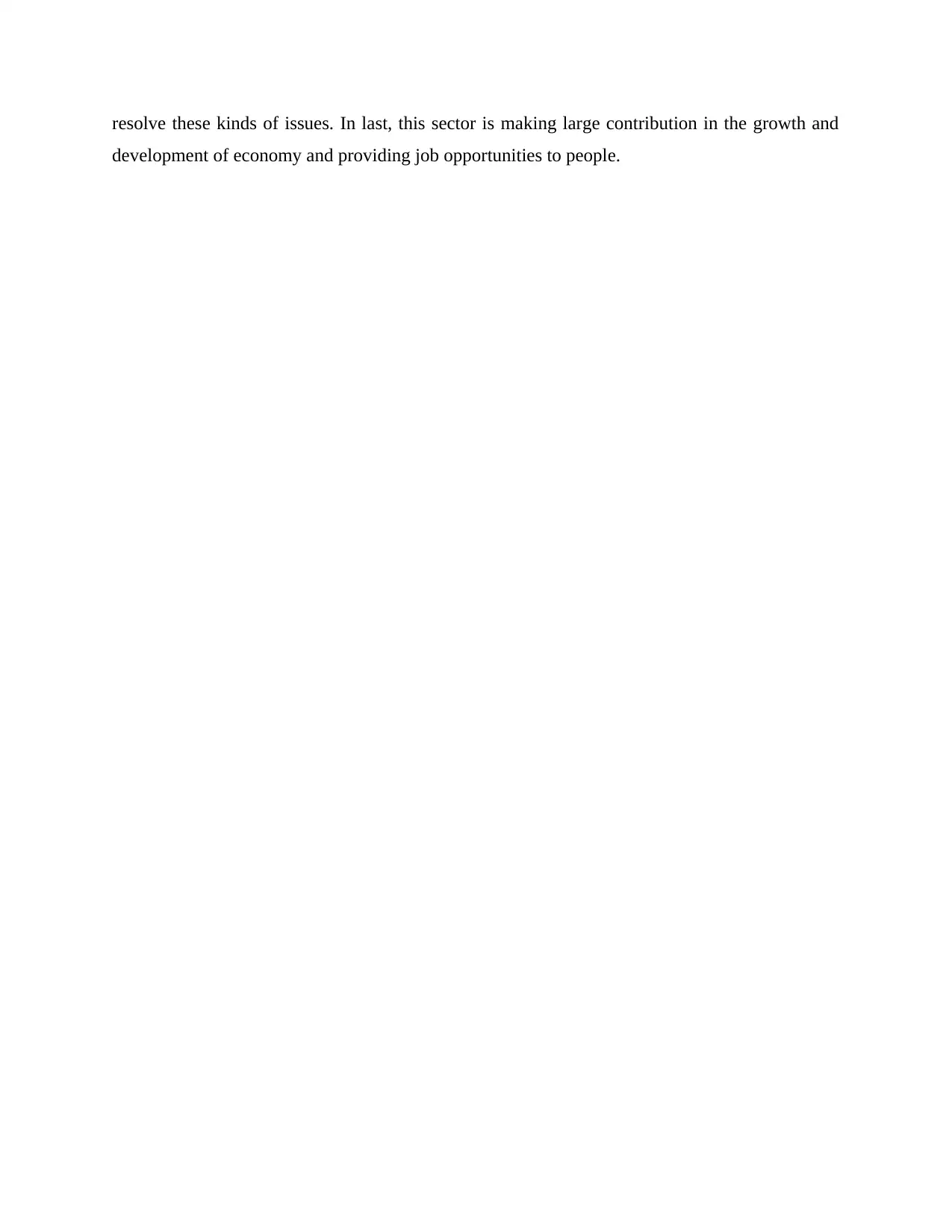
resolve these kinds of issues. In last, this sector is making large contribution in the growth and
development of economy and providing job opportunities to people.
development of economy and providing job opportunities to people.
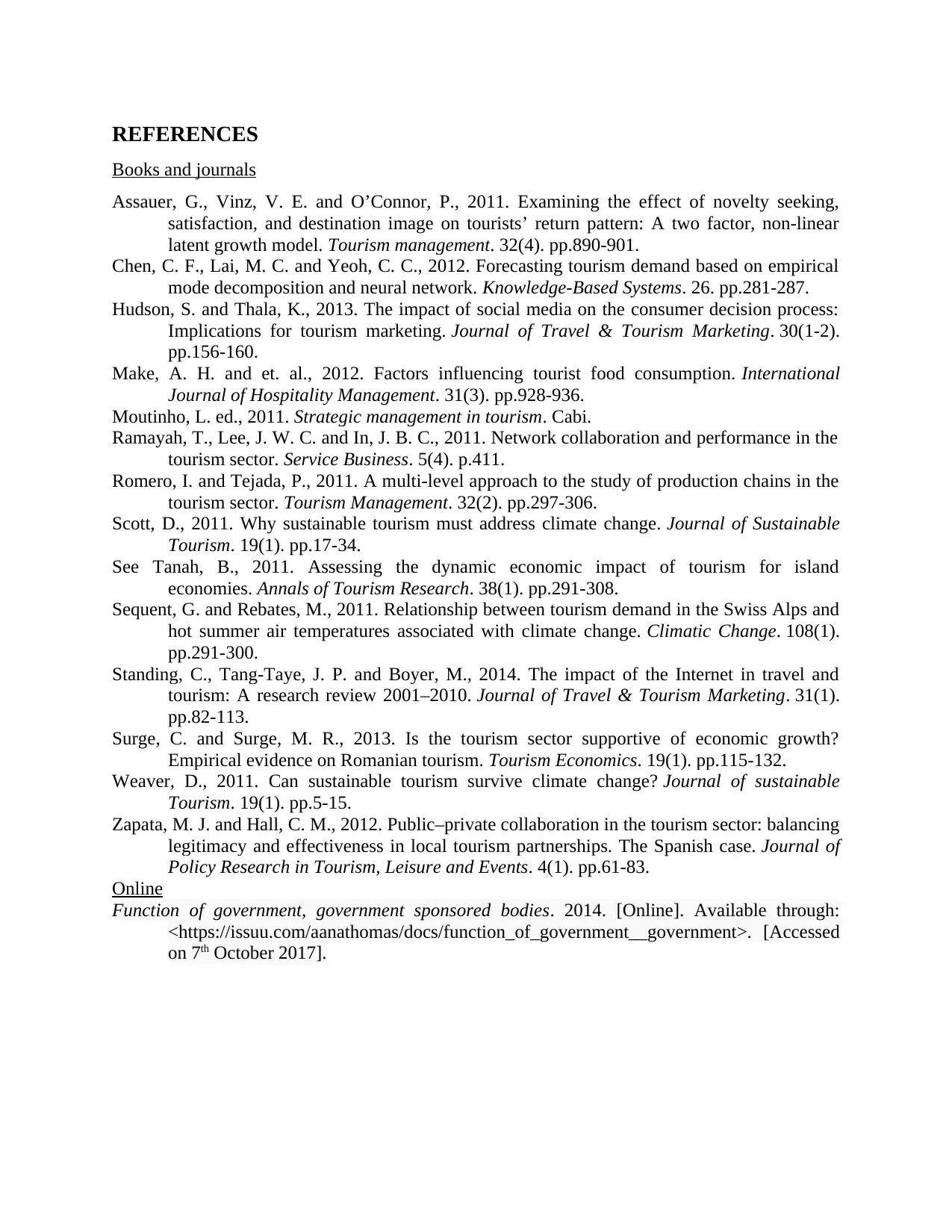
REFERENCES
Books and journals
Assauer, G., Vinz, V. E. and O’Connor, P., 2011. Examining the effect of novelty seeking,
satisfaction, and destination image on tourists’ return pattern: A two factor, non-linear
latent growth model. Tourism management. 32(4). pp.890-901.
Chen, C. F., Lai, M. C. and Yeoh, C. C., 2012. Forecasting tourism demand based on empirical
mode decomposition and neural network. Knowledge-Based Systems. 26. pp.281-287.
Hudson, S. and Thala, K., 2013. The impact of social media on the consumer decision process:
Implications for tourism marketing. Journal of Travel & Tourism Marketing. 30(1-2).
pp.156-160.
Make, A. H. and et. al., 2012. Factors influencing tourist food consumption. International
Journal of Hospitality Management. 31(3). pp.928-936.
Moutinho, L. ed., 2011. Strategic management in tourism. Cabi.
Ramayah, T., Lee, J. W. C. and In, J. B. C., 2011. Network collaboration and performance in the
tourism sector. Service Business. 5(4). p.411.
Romero, I. and Tejada, P., 2011. A multi-level approach to the study of production chains in the
tourism sector. Tourism Management. 32(2). pp.297-306.
Scott, D., 2011. Why sustainable tourism must address climate change. Journal of Sustainable
Tourism. 19(1). pp.17-34.
See Tanah, B., 2011. Assessing the dynamic economic impact of tourism for island
economies. Annals of Tourism Research. 38(1). pp.291-308.
Sequent, G. and Rebates, M., 2011. Relationship between tourism demand in the Swiss Alps and
hot summer air temperatures associated with climate change. Climatic Change. 108(1).
pp.291-300.
Standing, C., Tang-Taye, J. P. and Boyer, M., 2014. The impact of the Internet in travel and
tourism: A research review 2001–2010. Journal of Travel & Tourism Marketing. 31(1).
pp.82-113.
Surge, C. and Surge, M. R., 2013. Is the tourism sector supportive of economic growth?
Empirical evidence on Romanian tourism. Tourism Economics. 19(1). pp.115-132.
Weaver, D., 2011. Can sustainable tourism survive climate change? Journal of sustainable
Tourism. 19(1). pp.5-15.
Zapata, M. J. and Hall, C. M., 2012. Public–private collaboration in the tourism sector: balancing
legitimacy and effectiveness in local tourism partnerships. The Spanish case. Journal of
Policy Research in Tourism, Leisure and Events. 4(1). pp.61-83.
Online
Function of government, government sponsored bodies. 2014. [Online]. Available through:
<https://issuu.com/aanathomas/docs/function_of_government__government>. [Accessed
on 7th October 2017].
Books and journals
Assauer, G., Vinz, V. E. and O’Connor, P., 2011. Examining the effect of novelty seeking,
satisfaction, and destination image on tourists’ return pattern: A two factor, non-linear
latent growth model. Tourism management. 32(4). pp.890-901.
Chen, C. F., Lai, M. C. and Yeoh, C. C., 2012. Forecasting tourism demand based on empirical
mode decomposition and neural network. Knowledge-Based Systems. 26. pp.281-287.
Hudson, S. and Thala, K., 2013. The impact of social media on the consumer decision process:
Implications for tourism marketing. Journal of Travel & Tourism Marketing. 30(1-2).
pp.156-160.
Make, A. H. and et. al., 2012. Factors influencing tourist food consumption. International
Journal of Hospitality Management. 31(3). pp.928-936.
Moutinho, L. ed., 2011. Strategic management in tourism. Cabi.
Ramayah, T., Lee, J. W. C. and In, J. B. C., 2011. Network collaboration and performance in the
tourism sector. Service Business. 5(4). p.411.
Romero, I. and Tejada, P., 2011. A multi-level approach to the study of production chains in the
tourism sector. Tourism Management. 32(2). pp.297-306.
Scott, D., 2011. Why sustainable tourism must address climate change. Journal of Sustainable
Tourism. 19(1). pp.17-34.
See Tanah, B., 2011. Assessing the dynamic economic impact of tourism for island
economies. Annals of Tourism Research. 38(1). pp.291-308.
Sequent, G. and Rebates, M., 2011. Relationship between tourism demand in the Swiss Alps and
hot summer air temperatures associated with climate change. Climatic Change. 108(1).
pp.291-300.
Standing, C., Tang-Taye, J. P. and Boyer, M., 2014. The impact of the Internet in travel and
tourism: A research review 2001–2010. Journal of Travel & Tourism Marketing. 31(1).
pp.82-113.
Surge, C. and Surge, M. R., 2013. Is the tourism sector supportive of economic growth?
Empirical evidence on Romanian tourism. Tourism Economics. 19(1). pp.115-132.
Weaver, D., 2011. Can sustainable tourism survive climate change? Journal of sustainable
Tourism. 19(1). pp.5-15.
Zapata, M. J. and Hall, C. M., 2012. Public–private collaboration in the tourism sector: balancing
legitimacy and effectiveness in local tourism partnerships. The Spanish case. Journal of
Policy Research in Tourism, Leisure and Events. 4(1). pp.61-83.
Online
Function of government, government sponsored bodies. 2014. [Online]. Available through:
<https://issuu.com/aanathomas/docs/function_of_government__government>. [Accessed
on 7th October 2017].
1 out of 16
Related Documents
Your All-in-One AI-Powered Toolkit for Academic Success.
+13062052269
info@desklib.com
Available 24*7 on WhatsApp / Email
![[object Object]](/_next/static/media/star-bottom.7253800d.svg)
Unlock your academic potential
© 2024 | Zucol Services PVT LTD | All rights reserved.




